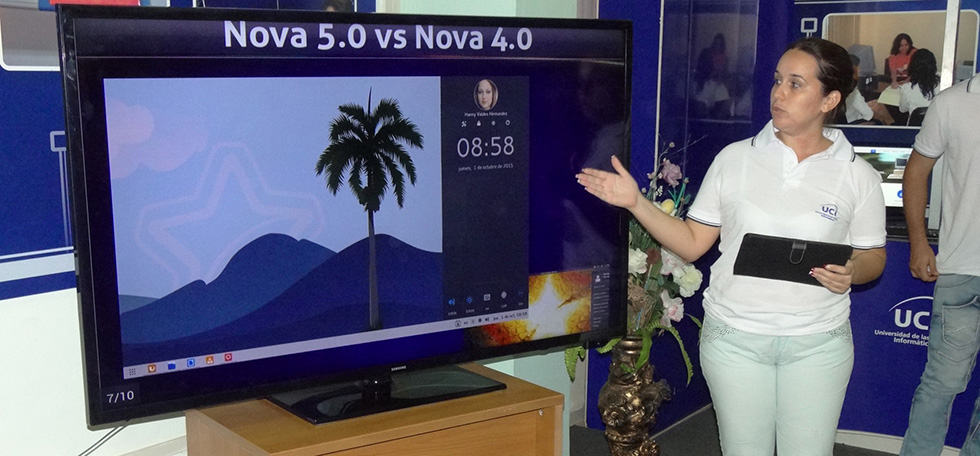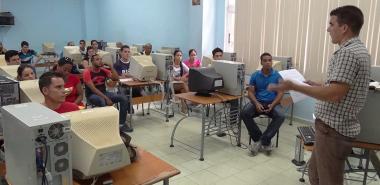Launching of Nova 5.0 in the university. Photo: Alberto Medina Cruz
What we defend is Nova
At the University of Informatics Sciences (known as UCI) the migration updating continues to the operating system Nova 5.0. For this reason, our informative writing dialogues with the MSc. Denys Buedo Hidalgo, vice-rector for Technology, and engineer Alexander Rodríguez Mompié, Director of Computerization, to know the details of this process in our house of high studies.
- How is the upgrade of the migration to Nova version 5.0 planned for the rest of the university areas?
MSc. Denys Buedo Hidalgo (DBH)
Ing. Alexander Rodríguez Mompié (ARM)
DBH: It is planned to update all areas. Most places migrated to Nova 3.0 and now what we are doing is an update of all these areas, only had the new version the images that were used for teaching. In principle, we are updating the entire University to Nova 5.0.
"It is important that people understand that it is an update, not a migration, because we already did this and it is something that normally happens in the world; There are people who are more independent than others, and there may be those who have already installed the operating system without the help of our team; But I reiterate that what we are doing is an update with the new version. "
ARM: There are users who perform the update alone and there are others who need our help.
- How many colleagues are involved in the task?
ARM: 30 people are working, which come from the Free Solutions Center, the Computerization Department and the Technological Management Department, directly migrating, and there are others that are assisting to incidents.
"For this reason we must distribute the force according to the number of machines, the number of people to migrate.
"In addition, there are people of Computer Security incorporated because together with the migration is to incorporate the digital signature of all the staff of the University, that is, other areas are partners involved in migration that do not have to do directly with it , But are also performing other tasks that are also planned.
- How did the Rectorate start the process of updating?
DBH: Last Monday, October 24th, the update began at the Rectorate, and everything happened as planned. The Staff was told that they would only upgrade; Although Mondays are days of many activities that imply that some people are out of their jobs.
"In the case of the Rectorate, the migrant teams are asked to try to ensure that the person responsible for the machine is always there to avoid any problems with the loss of information or the breaking of a computer.
"For example, the Command Post was the first computer to be migrated and here the personnel that uses it is not from the technological area and everything happened normal, without problems; After a few minutes they were working normally, without any difficulty.
"All the upgrade work started well and quiet. So far no one has knocked on the door saying he had a problem. "
- How have users taken over this process?
DBH: They have assumed it normal, something natural. There are areas that are going to have more difficulties because of the work they do, but everything has happened without mishaps.
- Some users suggest that training or training should be given to those who do not have knowledge about working with free operating systems, is this possible?
DBH: We call this accompaniment and we have it foreseen. The migrating team does its work and if the user needs help, this is possible, despite all the information that has been given, but I repeat as what we are doing is an update, in principle, there are already staff who can work with the OS.
"The Rectorate uses a lot of mail, documents and Internet access and these tools are similar to the ones we have used so far. The change is not very large except in the Office package that does have some differences, but in terms of mail and Internet browsing, it's the same.
"In the accompaniment can be someone of the migration team or else we do it through the Support Center or the Free Solutions. In addition, we train Technological Management technicians in each area to take up this task in their workplace, but that should not be a problem. "
ARM: In the planning it was proposed a week to migrate and another one to help those people facing any problem at present, after all this work we have the train technicians of the area , as appropriate, and the Support Center for any eventuality. In the same way you can contact the migration team to resolve any difficulties that may occur.
- At what time is this migration update expected to occur?
ARM: For the migration there is no planned schedule, what we did was to plan everything we want to do to advance as much as possible in the areas before the end of the year and then, when we return, we continue, because it does not give time to do it throughout the University before the end of the current year.
"There is a framework schedule that foresees the amount of time that we are going to delay in the areas with an approximation of time according to the technology that they have, but we do not have it by date because there are factors that are not precise, as for example the date of departure and return from the holidays at the end of year, that is why when we return again we are going to work on what is left to be done ".
DBH: We are expecting the Rectorate, the central offices and the faculties to finish in the months of November and December, that is the plan, thetre is the greatest work in the University. But if we achieve it, we work the rest of the year to migrate vice-rectories , directions and faculties, we will have almost 70% of the university migrated.
"The faculties have three phases or large areas: the Development Centers, the teaching laboratories and the administrative offices. The laboratories already have Nova, so they are already migrated and updated.
"In the case of Development Centers, most of them already use free technologies and some do not use Nova, but another free software distribution, and we suggest that free technology is used; We are not forcing anyone to use Nova, but if they are going to use a free operating system, they have to use one that has support at the University so they do not have problems with upgrades or security, and the second reason is that we defend Nova and we only support Nova.
"We are not responsible with the update repositories for other free systems, we bet on Nova and we support Nova because it is our system.
"The rest of the remaining areas will be carried out in the month of January and these should be those that are subordinated to the vice-rectories, Residence and others of the areas of services, that have specific characteristics."
ARM: Already this work in Faculty 1 is advanced because it was the one that was used as pilot and was where the tests were done for the new image of Nova and already the administrative part was updated, reason why it is a faculty less within the schedule .
- Some other information of interest to the university community.
DBH: We want to explain to users that it is necessary and obligatory to migrate to the new version 5.0 of Nova for all the advantages and problems that it solves with respect to the previous one, so it is necessary that everyone sees it this way. We know that there are people who for a reason have returned to use Windows operating system and what we want is to know that we must be discipline with the policy that we have established in the University and that we will help all people in all that is necessary.
"Therefore, it is necessary that there are no vulnerabilities in our systems, and that users see it as a natural update of any operating system."
ARM: It is important to add that this new update already includes all the necessary tools for the work of each person in the activity that he/she performs.




